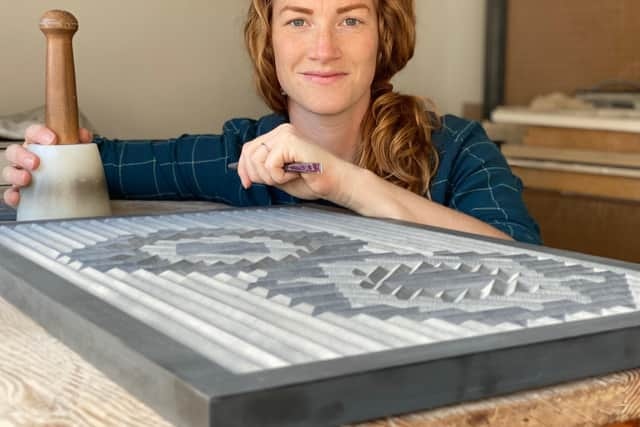'I wouldn't have been able to pursue a career in kiltmaking without it' - Applications for funding of up to £18,000 open for UK craftspeople
Queen Elizabeth Scholarship Trust, which has previously supported a number of craftspeople in Scotland from a bookbinder on Iona to a kiltmaker in Edinburgh awards funding – up to £18,000 – for the further training and education of talented and aspiring makers and craftspeople across the UK.
Emma Wilkinson, who works for Gordon Nicolson Kiltmakers, Edinburgh, is one artist who has been supported through the organisation’s funding scheme.
Advertisement
Hide AdAdvertisement
Hide Ad"I wouldn't have been able to pursue a career in kiltmaking without the help of QEST,” she said.


"It wasn't just the funding for the tuition, but the ongoing support and the confidence that I was on the right path was invaluable.
“Since then it has been a constant source of inspiration to keep going, it's great being part of their community with other makers and they are always promoting our work through their channels.
"I was so over the moon when I received my award. I would advise makers to have the confidence to go for it and make that application - QEST will see your potential and support you in following your dreams."
The financial support goes towards covering tuition fees, apprenticeships or other programmes artists wish to embark on to better their skills.


Paper folder Kate Colin from Glasgow used her QEST funding to attend a selection of taught courses, as well as one-to-one classes with folding professionals in Switzerland and Germany, an internship at Ciment Pleating in Hertfordshire, and also a study trip to the Fan Museum in London and leading fan makers in Paris.
Stone artist Zoe Wilson, who is based in Aberdeen, used her QEST funding to complete a course tailored to her passion.
She said: “The financial support I received was amazing and it allowed me to complete my studies in Historic Stone Carving at City and Guilds of London Art School.
Advertisement
Hide AdAdvertisement
Hide Ad"Since then I’ve had some incredible opportunities through QEST, which have no doubt had a really positive affect on my business.


"Being a QEST scholar really helps to raise the profile of my work and enables me to promote it to a much wider audience.”
Katherine Boyle, head of communications at QEST said: “When assessing applications we look for a level of excellence, commitment to a career in the chosen craft and the ability to demonstrate how the additional skills they would learn with their QEST funding would help to develop their practice and career.
"Historically the majority of our applications have come from London and the South East - we want to address this by reaching out to talented makers in Wales, Scotland and Northern Ireland and encouraging them to apply.”
QEST supports about 40 craftspeople a year from a range of about 400 to 500 applications.


The scheme is open to any nationality, but applicants must be over 18 and living and working in the UK - there is no upper age limit.
The application process happens twice a year in January and July. The deadline for completing an application in this round is February 15.
A message from the Editor:
Thank you for reading this article. We're more reliant on your support than ever as the shift in consumer habits brought about by coronavirus impacts our advertisers.
If you haven't already, please consider supporting our trusted, fact-checked journalism by taking out a digital subscription.
Comments
Want to join the conversation? Please or to comment on this article.